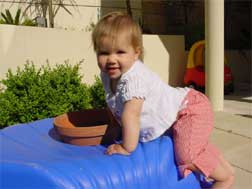Children's Dental Health

Many childhood practices affect dental health. Well-informed providers can help children to have healthy smiles.
Bottle mouth, the name for decayed front teeth, occurs mostly in children nine months to three years old who use bottles for comforting. When the child takes a bottle to bed or wanders around with the bottle in his mouth, the liquid stays on the teeth for a long while. Bacteria break down the carbohydrates in milk or juice. This process causes acids to form. The acids break down teeth and cause cavities. If children need a bottle for comforting, it should contain only water. Substitute other comforters such as a stuffed toy, soft cloth, or pacifier.
Sticky snacks that stick on teeth also cause cavities. Chewing gum and chewy candies are never recommended. Children should brush their teeth or rinse their mouths after eating some otherwise healthy snacks like raisins and dried fruit. Apples, on the other hand, act like a toothbrush, cleaning food from teeth.
Fear of dentists is not unusual in young children. Providers can help children see that dentists are helpers. Talk with them about going to the dentist in a calm, factual, and unafraid manner. Children can play "dentists office," pretending to be dentists, hygienists, and patients. Some county dental associations have promotional materials. Check with your dentist to see what is available in your area.
Encourage children to brush their teeth. Two-year-olds, who want to do everything by themselves, should brush their own teeth. But you should supervise closely and teach them the correct way to do it. Have them brush after every meal. If that is impossible, have children rinse their mouths carefully. Help toddlers brush, and after babies have eaten, wipe their teeth with a soft cloth. Each child needs her own toothbrush. Brushes should be changed at least every three months.
Thumb-sucking can have unfortunate consequences. If a child sucks their thumb after the age of three or four, encourage the child to stop. By the time that permanent teeth come in (around five to six years of age), thumb-sucking children are likely to develop an open bite. They may also develop tongue-thrust swallowing, which aggravates the open bite. Long-term thumb-sucking causes flaring of the upper teeth and changes the anatomy of the upper jaw. Get the book *David Decides About Thumb-sucking* by Susan Heitler. It offers helpful information about the situation for parents and children. Orthodontists recommend the use of "orthodontic pacifiers" because pacifiers are easier than thumbs to throw away.
If an accident knocks a tooth loose, parents should talk to the child's dentist. Usually, the teeth will survive, but the dentist should check.
Thanks to Dr. Alan Broadbent and Dr. Robert Fleming, consultants for this article.
*** Reprinted with permission from the National Network for Child Care - NNCC. Morse, N.F. (1992). Children's dental health. In Todd, C.M. (Ed.), *Day care center connections*, 1(5), pp. 6-7. Urbana-Champaign, IL: University of Illinois Cooperative Extension Service.
Bottle mouth, the name for decayed front teeth, occurs mostly in children nine months to three years old who use bottles for comforting. When the child takes a bottle to bed or wanders around with the bottle in his mouth, the liquid stays on the teeth for a long while. Bacteria break down the carbohydrates in milk or juice. This process causes acids to form. The acids break down teeth and cause cavities. If children need a bottle for comforting, it should contain only water. Substitute other comforters such as a stuffed toy, soft cloth, or pacifier.
Sticky snacks that stick on teeth also cause cavities. Chewing gum and chewy candies are never recommended. Children should brush their teeth or rinse their mouths after eating some otherwise healthy snacks like raisins and dried fruit. Apples, on the other hand, act like a toothbrush, cleaning food from teeth.
Fear of dentists is not unusual in young children. Providers can help children see that dentists are helpers. Talk with them about going to the dentist in a calm, factual, and unafraid manner. Children can play "dentists office," pretending to be dentists, hygienists, and patients. Some county dental associations have promotional materials. Check with your dentist to see what is available in your area.
Encourage children to brush their teeth. Two-year-olds, who want to do everything by themselves, should brush their own teeth. But you should supervise closely and teach them the correct way to do it. Have them brush after every meal. If that is impossible, have children rinse their mouths carefully. Help toddlers brush, and after babies have eaten, wipe their teeth with a soft cloth. Each child needs her own toothbrush. Brushes should be changed at least every three months.
Thumb-sucking can have unfortunate consequences. If a child sucks their thumb after the age of three or four, encourage the child to stop. By the time that permanent teeth come in (around five to six years of age), thumb-sucking children are likely to develop an open bite. They may also develop tongue-thrust swallowing, which aggravates the open bite. Long-term thumb-sucking causes flaring of the upper teeth and changes the anatomy of the upper jaw. Get the book *David Decides About Thumb-sucking* by Susan Heitler. It offers helpful information about the situation for parents and children. Orthodontists recommend the use of "orthodontic pacifiers" because pacifiers are easier than thumbs to throw away.
If an accident knocks a tooth loose, parents should talk to the child's dentist. Usually, the teeth will survive, but the dentist should check.
Thanks to Dr. Alan Broadbent and Dr. Robert Fleming, consultants for this article.
*** Reprinted with permission from the National Network for Child Care - NNCC. Morse, N.F. (1992). Children's dental health. In Todd, C.M. (Ed.), *Day care center connections*, 1(5), pp. 6-7. Urbana-Champaign, IL: University of Illinois Cooperative Extension Service.
MORE





